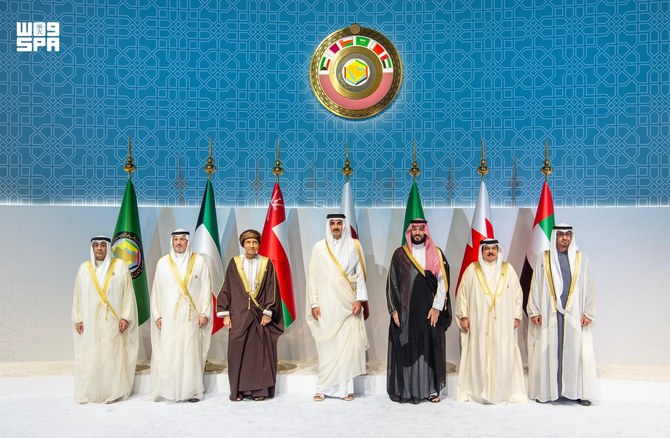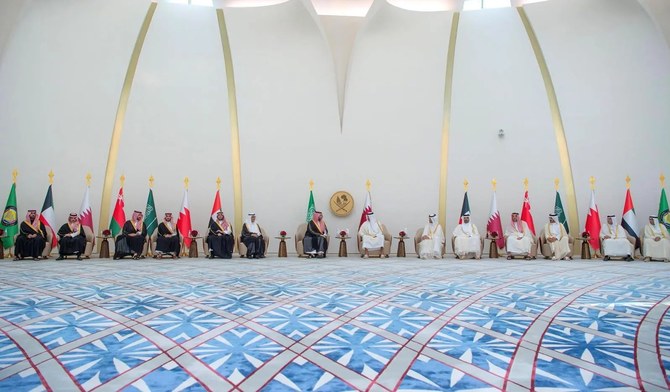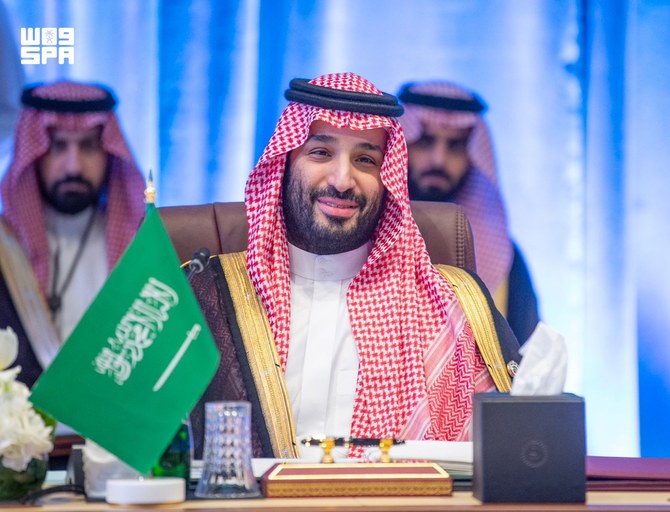RIYADH: Members of the GCC have condemned Israel for committing “clear violations” of international law and reitterated their demand for an end to the Israeli occupatiuon of the Palestinian territories.
In a statement issued at the end of the 44th session of the Gulf Cooperation Council on Tuesday, the leaders of the six nations condemned Israel’s ongoing military actions in Gaza, “which have led to the forced displacement of the civilian population, and the destruction of civilian facilities and infrastructure, including residential buildings, schools, health facilities, and places of worship.”
The statement of decleration went on to say such actions were “in clear violation of international law and international humanitarian law,” and they expressed their dissatisfaction with the “blatant Israeli aggression against the Palestinian people”.
The summit, which was attended by Crown Prince Mohammed bin Salman as the lead member of the Saudi delegation, was in Qatar.
The representatives of the six Gulf nations were joined by Turkish President Recep Tayyip Erdogan who said there had been $23bn worth of trade between Turkiye and the GCC countries.
He went on to condemn Israel’s continued bombardment of the Gaza Strip, adding: “Netanyahu is committing war crimes against humanity in Gaza.”
And he said that Netanyahu “is pushing the entire region into danger for the sake of his political future.”
The meeting of GCC leaders took place as Israeli forces launched their long-awaited storm of the main city in the southern Gaza Strip, where hospitals were overrun with scores of Palestinian dead and wounded.
In what appeared to be the biggest ground assault since the truce collapsed last week, residents said Israeli tanks had entered the eastern parts of Khan Younis for the first time, crossing from the Israeli border fence and advancing west.
Some took up positions inside the town of Bani Suhaila on Khan Younis’ eastern outskirts, while others continued further and were stationed on the edge of a Qatari-funded housing development called Hamad City, residents said.
After days of ordering residents to flee the area, Israeli forces dropped new leaflets on Tuesday with instructions to stay inside shelters during the assault.
“In the coming hours, the IDF (Israel Defence Forces) will begin launching an intensive attack on your area of residence to destroy the terrorist organization Hamas," said the leaflets.
“Don’t move out yet. For your safety, stay in the shelters and the hospitals where you are. Don’t get out. Going out is dangerous. You have been warned.”
But Israel’s bombardment has driven 80 percent of Gaza’s 2.3 million residents from their homes, most fleeing south – an area more densely populated than London.
And according to Gaza health officials deemed reliable by the United Nations, more than 15,800 people are confirmed dead, with thousands more missing and feared buried under rubble.
فيديو | #ولي_العهد الأمير محمد بن سلمان في قطر لترؤس وفد المملكة في #القمة_الخليجية #ولي_العهد_في_قطر #الإخبارية pic.twitter.com/AnXXqja4j4
— قناة الإخبارية (@alekhbariyatv) December 5, 2023
The declaration went onto to call for the immediate resumption of a humanitarian truce in the Gaza Strip in order to achieve a sustainable ceasefire and the assurance of that all humanitarian aid would reach its intended destinations.
The summit pledged its ongoing support for the Palestinian people and its continued support to alleviate the suffering of the residents of the Gaza Strip.
The GCC statement also agreed to help rebuild “what the Israeli war machine destroyed in its attacks on the Strip during the past years.”
The GCC leaders warned that if the war continued there was a danger of the conflict expanding to other regions in the Middle East, something it warned would lead to “dire consequences for the peoples of the region and for international peace and security.”
And they called on the international community to intervene to establish a ceasefire and protect civilians.
The council reiterated its demand for an end to the occupation of Palestine, and its support for the sovereignty of the Palestinian people over all the occupied territories.
It praised Saudi Arabia’s continued efforts and its initiative in partnership with the Arab League, the European Union, the Arab Republic of Egypt and the Hashemite Kingdom of Jordan to revive the peace process, in accordance with international law, United Nations resolutions and the Arab Peace Initiative of 2002.
Earlier in his opening remarks, Qatar’s Emir Sheikh Tamim bin Hamad Al-Thani called on the UN Security Council to force Israel to return to the negotiating table over the war in Gaza.
“It is shameful for the international community to allow this heinous crime to continue for nearly two months, during which the systematic and deliberate killing of innocent civilians continues, including women and children,” he said at the summit.
The Qatari ruler said his country was “constantly working to renew” the truce, which he added was “not an alternative to a permanent ceasefire”.
He called for “an international investigation into the massacres committed by Israel” and condemned the targeting of civilians of all nationalities and religions.
The GCC council released a declaration at the end of the summit, with Qatari Foreign Minister Mohammed bin Abdulrahman bin Jassim Al Thani saying that their primary goal now is to stop the war in Gaza, adding that mediation talks on Gaza are still ongoing.
The minister reiterated how it is unacceptable to prevent humanitarian aid from reaching the besieged strip.
(With Reuters)

































